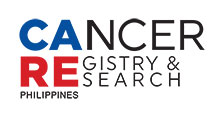Dear CARERS,
Some of you may be wondering why the CARE PH summary data seen in our careph.org website does not have outcome data. Epidemiologic outcomes like incidence, prevalence and mortality rates are the purview of population-based cancer registries, while clinical outcomes like remission rates, relapse rates, 2 or 5 year survival rates, while these can be captured by the CARE PH app in individual local area networks, are usually not encoded by hospital tumor registrars, as they are not trained to do this.
Your hospital clinical researchers can still use the CARE PH app to gather data for specific cancer sites, including ICD-O classification, stage upon diagnosis, treatments given and treatment outcomes, following an IRB- approved protocol. At present, specialty societies like the Philippine College of Hematology and Blood Transfusion, the Philippine Society of Urologic Oncology and the Philippine College of Chest Physicians, with the help of CARE PH Research Group, have initiated site specific cancer registries that collect more granular data. These registries still have a high percentage of missing data, but the good news is, more and more clinical researchers are realizing the value of registries and of data analytics.
For hospital-based cancer registries, the outcome of interest or research questions whose answers can be found by analysis of data contained within could be “What cancers are most commonly diagnosed or treated in this hospital?”, or “What percentage of cancer patients are diagnosed and treated in this hospital, diagnosed elsewhere but treated here, or diagnosed here but treated elsewhere?” Such outcomes help your cancer center administration identify areas that could be improved or supported, or help you decide what new technology your hospital should invest in, for better cancer care for your patients and your surrounding community.
CARE PH’s vision is to move towards better healthcare for Filipino cancer patients by providing an internet application that is capable of sharing de-identified data to a central hospital-based cancer registry system. A natural area of growth for CARE PH to move into is clinical and epidemiologic research.
Registry and research are like soulmates that have recently found each other, at least in the healthcare ecosystem. Each existed on its own, but together, they now have so much more relevance and meaning.
Or, to further the healthcare ecosystem metaphor, disease registries are like the roots of the healthcare tree that are grounded and founded on data, organized in its trunk called registry, and its branches and leaves are researches that feed on this database and expand our knowledge, with fruits that nourish our search for truth.
There are recent changes in health research that have impacted on the emergence of registries, on the methods of data collection and on data analysis. Advancements in health information technology, digital transformation in healthcare, and the use of artificial intelligence in the analysis of de-identified big data now allow us to find answers to our research questions, and validate these answers, with a speed never before imagined.
CARE PH was contracted in 2022 by the World Health Organization and the DOH to create a Development Plan for the Philippine Cancer Center-Scientific Research Data Center. We also collaborated with specialty societies and initiated several site-specific cancer registries. We are also excited, together with the University of the Philippines and the Massachusetts Institute of Technology, to be part of the organizing committee of the 2023 Philippine Health AI Summit and Datathon.
This 2023 will surely be a year of further growth for us. On behalf of the Registry Group and the Research Group of CARE PH, I thank you for your continued support for our organization, and we hope you will continue to grow along with us until “every preventable cancer is averted, every screenable cancer is detected, and every cancer patient (is) counted”.
Trixie
